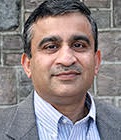
| Time | Event |
|---|---|
| 8:00am-8:20am | Health Day opening and Paper Spotlight Session |
| 8:20am-9:15am | Health Day Plenary Panel: Saving Lives with Data Science |
| 9:15am-9:30am | Coffee Break |
| 9:30am-9:35am | epiDAMIK opening remarks |
| 9:35am-10:25am | Invited Keynote 1. Prof. Rumi Chunara (NYU)
[expand]
 Rumi Chunara is an Assistant Professor at NYU, jointly appointed at the Tandon School of Engineering (in Computer Science) and the College of Global Public Health. Her research interests are in using person-generated data sources for population-level disease surveillance. In doing so, Dr. Chunara develops statistical and machine learning methodology for using these observational data sources in disease modeling efforts.
Rumi Chunara is an Assistant Professor at NYU, jointly appointed at the Tandon School of Engineering (in Computer Science) and the College of Global Public Health. Her research interests are in using person-generated data sources for population-level disease surveillance. In doing so, Dr. Chunara develops statistical and machine learning methodology for using these observational data sources in disease modeling efforts.
Dr. Chunara joined NYU in 2015. Previously she was an Instructor at Harvard Medical School, the Children’s Hospital Informatics Program and HealthMap. She completed her PhD at the Harvard-MIT Division of Health, Sciences and Technology, Master’s degree at MIT in Electrical Engineering and Computer Science and received her Bachelor’s degree in Electrical Engineering from Caltech with honors. Her research has been reported on widely including in NBC.com, CNN.com, and Scientific American. Chunara is a recipient of the MIT Presidential Fellowship and a Caltech Merit Scholarship, the NYC Media Lab - Bloomberg Data for Good Exchange Paper Award and was selected as an MIT Technology Review Top 35 Innovator under 35 in 2014.
Abstract: High-resolution data sources can improve how we target intervention efforts and spend public health budgets. However, if the data is unstructured or generated observationally by select populations, there are computational challenges that must be addressed in order to assess practical epidemiological measures from it or include the data in epidemiological models. In this talk I will discuss areas in which we are addressing these challenges by using data mining and machine learning approaches to generate high-resolution features for epidemiological models and improving prediction efforts in both infectious and non-communicable diseases. Examples will include domain adaptation for predicting infection from community-sourced data, natural language processing to learn temporal representations of health behaviors, and unsupervised methods to learn spatial representations of health risks from noisy, irregular and sparse data.
|
| 10:25am-11:15am | Invited Keynote 2. Prof. Madhav Marathe (VT)
[expand]
 Madhav Marathe is the director of the Network Dynamics and
Simulation Science Laboratory, Biocomplexity Institute and a
professor in the department of computer science, Virginia Tech.
His research interests are in network science, foundations of computing,
high performance computing and their applications to problems in one-health, inter-dependent
infrastructures and social sciences.
Before coming to Virginia Tech, he was a Team Leader
in the Basic and Applied Simulation Science Group that is a part of
the Computer and Computational Sciences division at the Los Alamos National
Laboratory (LANL). He is a Fellow of the IEEE, ACM, SIAM and AAAS.
Madhav Marathe is the director of the Network Dynamics and
Simulation Science Laboratory, Biocomplexity Institute and a
professor in the department of computer science, Virginia Tech.
His research interests are in network science, foundations of computing,
high performance computing and their applications to problems in one-health, inter-dependent
infrastructures and social sciences.
Before coming to Virginia Tech, he was a Team Leader
in the Basic and Applied Simulation Science Group that is a part of
the Computer and Computational Sciences division at the Los Alamos National
Laboratory (LANL). He is a Fellow of the IEEE, ACM, SIAM and AAAS.
Abstract: The H1N1 pandemic of 2009 and the 2014 Ebola outbreak in West Africa serve as a
reminder of the social, economic and health burden of infectious diseases.
The ongoing trends towards urbanization, global travel, climate change and a generally older
and immuno-compromised population continue to make epidemic
planning and control challenging. Recent advances in computing, AI and bigdata have created
new opportunities for realizing the vision of real-time epidemic science.
In this talk I will overview of the state of the art in
computational epidemiology with an emphasis on computational thinking
and on the development of scalable and pervasive computing techniques
for planning, forecasting and response in the event of epidemics.
I will draw on our work in supporting federal agencies during recent epidemic outbreaks
as well as the development of epidemic forecasting methods in collaboration with federal and
commercial partners. Computational challenges and directions for future research will be discussed.
|
| 11:15am-11:33am | Contributed Talk 1. Paper: Repeated Active Screening of Networks for Diseases. Authors: Biswarup Bhattacharya, Han Ching Ou, Arunesh Sinha, Sze-Chuan Suen, Bistra Dilkina and Milind Tambe. |
| 11:33am-11:50am | Contributed Talk 2. Paper: Epidemiological Data and Model Requirements to Support Policy. Authors: Marc Baguelin, Elizabeth Buckingham-Jeffery, Ian Hall, Thomas House, Timothy Kinyanjui and Lorenzo Pellis. |
| 11:50am-12:05pm | Discussion and Closing Remarks. |
| 12:05pm-1:30pm | Poster Session |
| 7:00pm-9:30pm | Joint KDD Poster Reception for selected workshop papers |
Repeated Active Screening of Networks for Diseases [PDF]
Biswarup Bhattacharya, Han Ching Ou, Arunesh Sinha, Sze-Chuan Suen, Bistra Dilkina and Milind Tambe
Validation of Network-Dependent Epidemic Processes: A Study of Dr. Snow's Seminal Cholera Dataset
[PDF]
Philip Pare, Ji Liu, Carolyn L. Beck, Tamer Basar and Angelia Nedich
Forecasting the Flu: Designing Social Network Sensors for Epidemics
[PDF]
Huijuan Shao, K.S.M. Tozammel Hossain, Hao Wu, Maleq Khan, Anil Vullikanti, B. Aditya Prakash, Madhav Marathe and Naren Ramakrishnan
A Topological Data Analysis Approach to Influenza-Like-Illness
[PDF]
Joao Pita Costa, Primož Škraba, Daniela Paolotti and Ricardo Mexia
Critical spatial clusters for vaccine preventable diseases
[PDF]
Jose Cadena, Achla Marathe and Anil Kumar Vullikanti
Identification of at risk groups for opioid addiction through web data analysis
[PDF]
Kaustav Basu, Sandipan Choudhuri, Arunabha Sen, Aniket Majumdar and Dipak Dey
Epidemiological Data and Model Requirements to Support Policy
[PDF]
Marc Baguelin, Elizabeth Buckingham-Jeffery, Ian Hall, Thomas House, Timothy Kinyanjui and Lorenzo Pellis
Dynamics underlying global spread of emerging epidemics: An analytical framework
[PDF]
Lin Wang and Joseph Wu
Cleanliness Campaign V/S Sanitation Related Diseases - Are they parallel in public perspective?
[PDF]
Aarzoo Dhiman, Durga Toshniwal, Soumya Somani, Preeti Malik